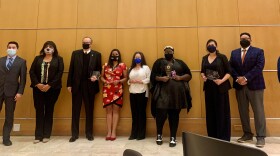The Johnson County Public Health Department has COVID-19 information available in about a half dozen languages.
But Samuel Jarvis, the community health manager for the department, said getting this translated information out during the pandemic can be really hard.
"Because the information changes quickly. And really, it has to be at a faster pace," he said.
The department has three employees who produce videos in Arabic, French and Spanish, and also provides informational flyers in languages like Swahili and Mandarin Chinese.
But Jarvis said despite their best efforts, he’s unsure if these resources are even getting to those who need them.
"It's hard to know, what's actually reaching folks, you know. Is it billboards? Maybe, maybe not. Is it radio ads? maybe, maybe not," he said.
According to Census data, more than 8 percent of Iowans say they speak a language other than English at home.
But getting reliable COVID-19 information to those who don’t speak English can be a challenge.
"A lot of news are in different languages or are not really -- like we don't know where this source comes from is one of the reasons confusing our community," said Abigail Sui. the family focus program director with the Ethnic Minorities of Burma Advocacy and Resource Center, known as EMBARC.
Sui said that’s why EMBARC has put out regular informational videos on its Facebook page since the start of the pandemic. They cover everything from vaccine information to getting the most recent stimulus check in nine foreign languages like Burmese, Spanish and Swahili.
The need for this resource is great. Many immigrants and refugees have been hard hit by the pandemic. They make up a significant chunk of the workforce at the state’s meat packing plants, where COVID-19 outbreaks have affected thousands of workers.
There are some resources available at the state level, like the option to use Google translate for the Iowa’s coronavirus website, and 211 operators have the option to use an interpretation service.
But Caleb Knutson, the chair of the Iowa Commission of Latino Affairs, said non-English speakers struggle to keep up with all the rapid updates.
"It's not fair for your elementary school, high school, middle school- aged children that have to be translating this information for you," he said.
Knutson said it took weeks for the state to start broadcasting Spanish interpretations of Gov. Kim Reynolds then-daily press briefings last year, and her ongoing updates are still not available in other languages.
Others share this same frustration.
"If you're sitting there talking for an hour every day, what you're saying must be important. Everybody needs to know what you're saying." said Polk County resident Josie Shaw, a native of Kenya. She’s worked as a Swahili interpreter for 15 years.
Shaw creates informational videos on COVID-19 for WhatsApp groups with Swahili-speaking refugees. She said she’s trying to combat all the misinformation they find on social media.
"They'll take that video, and just like I'm doing, they'll give it to everybody and their mama that they know. And they'll tell each other, ‘This is why you shouldn't take the vaccine,'" Shaw said.
Shaw said the problem is even when there is translated information, people don’t always know where to find it.
Plus, she said many refugees she works with don’t feel comfortable contacting government agencies, rendering contract interpretation services useless.
She said what does work is using community liaisons like herself to spread COVID-19 information.
"There's a trust factor, where they are thinking, like, ‘okay, who is telling us this? And why are they telling us this?’ So the source has to be known," Shaw said.
The Polk County Public Health Department launched a program in January with this idea in mind.
Nola Aigner-Davis, the communications officer with the department, said the grant-funded Train the Trainer program uses immigrant and refugee leaders to spread COVID-19 information.
"There were just a lot of huge gaps in education when it came to just the overall spread of COVID-19. You know, we've been in this pandemic for almost a year, and basic information still wasn't there," she said.
Aigner-Davis said they’ve trained about 20 leaders so far and hopes to continue the program even after the pandemic is over.





